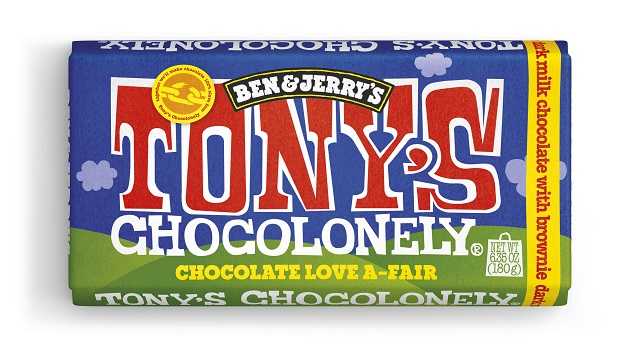BURLINGTON, Vt., USA – Two companies known for their passion for social justice have fallen bar over spoon for each other into a Chocolate Love A-Fair. Ben & Jerry’s has joined Tony’s Chocolonely’s mission to end modern slavery and child labor in the chocolate industry. It’s a match made in changemaker heaven. To celebrate their commitment, the ice cream and chocolate makers’ Flavor Gurus got busy making sweet treats inspired by each other.
Coming in January 2023, Chocolatey Love A-Fair, a new flavor from Ben & Jerry’s based on Tony’s popular milk caramel sea salt bar; and Tony’s Chocolate Love A-Fair, two new Tony’s bars inspired by Ben & Jerry’s Strawberry Cheesecake and Chocolate Fudge Brownie ice cream flavors. It’s love at first bite.
The cocoa beans from these brand-new chocolatey treats are sourced through Tony’s Open Chain which helps companies take steps to end modern slavery and child labor in the chocolate industry. Ben & Jerry’s will also begin converting its ice cream portfolio to Tony’s Open Chain, prioritizing the cocoa in the ice cream base mix. Ben & Jerry’s already pays farmers a Fairtrade Premium for their cocoa beans through an ongoing partnership with Fairtrade, and boosts this further by paying a Living Income Reference Price. As part of Tony’s Open Chain, Ben & Jerry’s will now also commit to Tony’s 5 Sourcing Principles which means, among other things, also paying a fee to further support the partner co-operatives in Côte d’Ivoire.
By adopting Tony’s 5 Sourcing Principles, companies take responsibility for ensuring a fully traceable cocoa supply chain and paying a higher price to address poverty, the root cause of social injustice for cocoa farmers. As a Mission Ally of Tony’s Open Chain and by beginning their conversion to buying cocoa directly from eight partner co-operatives in Côte d’Ivoire, Ben & Jerry’s will not only get to know which farmers produce the beans that go into their chocolatey ice cream, but also under which social and environmental circumstances they are grown. Full traceability and transparency of the cocoa supply chain is crucial to achieve social justice for cocoa farmers – and to enable dignified livelihoods.
“We began this journey seven years ago, when we first partnered with Fairtrade co-ops in Côte d’Ivoire, and this is the exciting next step in our cocoa journey as we amplify our commitment to farmers, equity, and ethical sourcing,” said Cheryl Pinto, Ben & Jerry’s Global Head of Values-led Sourcing. “Tony’s Open Chain enables us to combine traceability with sourcing principles that naturally align to Ben & Jerry’s mission and supports cocoa farmers to meet high standards on social and environmental practices while strengthening their co-operative.”
“Embracing the 5 Sourcing Principles of Tony’s Open Chain means unlocking the key elements to driving strong trading relationships and thriving cocoa communities,” Cheryl said, “We are serious about chocolatey ice cream, and we are eager to join forces with Tony’s Open Chain as a Mission Ally, on a delicious journey towards a more ethical future for cocoa production that all chocolate lovers deserve!”
Joke Aerts, Inspire to Actress (Tony’s Open Chain Lead) for Tony’s Chocolonely, said, “We are thrilled that Ben & Jerry’s joins us as a Mission Ally in Tony’s Open Chain. Not only will this partnership see large volumes of cocoa beans sourced via Tony’s Open Chain but collaborating with one of the world’s most-loved social justice companies truly puts our initiative on the map internationally and proves that our way of working is a solution for all players in the cocoa industry. I am confident that, together, we can make big strides towards eradicating modern slavery and child labor, stopping deforestation, and improving the livelihoods of West African cocoa farmers.”
Tony’s 5 Sourcing Principles:
- Transitioning to fully traceable cocoa beans.
- Paying an additional premium for their cocoa beans, enabling farmers to earn a living income.
- Promoting strong co-operatives to professionalize and make the work of cocoa farming safe and sustainable. Collectively, this means farmers stand strong and are empowered to change structural inequity in the value chain.
- Engaging in long-term commitments giving the farmers income security and the opportunity to invest in their businesses.
- Coaching farmers to improve their cocoa productivity and quality and improve their agricultural knowledge on relevant crops.


















